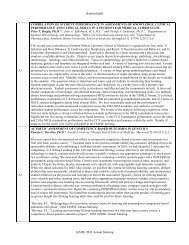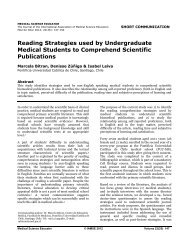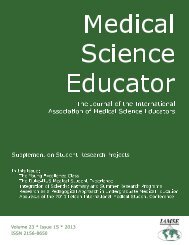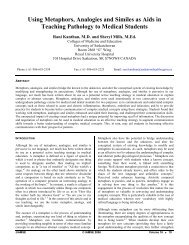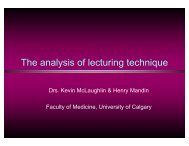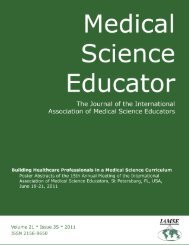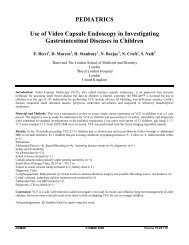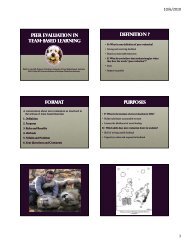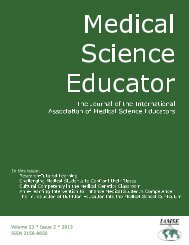Click here to view complete journal in pdf-format - IAMSE
Click here to view complete journal in pdf-format - IAMSE
Click here to view complete journal in pdf-format - IAMSE
Create successful ePaper yourself
Turn your PDF publications into a flip-book with our unique Google optimized e-Paper software.
MEDICAL SCIENCE EDUCATOR<br />
The Journal of the International Association of Medical Science Educa<strong>to</strong>rs<br />
Med Sci Educ 2012; 22(4S): 267-269<br />
KEYNOTE LECTURE<br />
Align<strong>in</strong>g Education and Assessment: Improv<strong>in</strong>g<br />
Medical Education through Assessment<br />
M. Brownell Anderson<br />
National Board of Medical Exam<strong>in</strong>ers, Philadelphia, PA, USA<br />
“The pupils got it all by heart; and when<br />
Exam<strong>in</strong>ation-time came,<br />
they wrote it down; and the Exam<strong>in</strong>er said,<br />
‘Beautiful! What depth!’<br />
They became teachers <strong>in</strong> their turn, and they<br />
said all those th<strong>in</strong>gs over<br />
aga<strong>in</strong>; and their pupils wrote it down, and the<br />
Exam<strong>in</strong>er accepted it; and<br />
nobody had the ghost of an idea what it meant”<br />
-Lewis Carroll, 1893<br />
Nearly all levels of medical education and tra<strong>in</strong><strong>in</strong>g<br />
are currently exam<strong>in</strong><strong>in</strong>g traditional methodologies<br />
<strong>to</strong> assess learner knowledge and competence.<br />
Medical science educa<strong>to</strong>rs are keys <strong>to</strong> <strong>in</strong>troduc<strong>in</strong>g<br />
students <strong>to</strong> the <strong>in</strong>tegration of the basic and cl<strong>in</strong>ical<br />
sciences and <strong>to</strong> provid<strong>in</strong>g relevant, <strong>in</strong>tegrated<br />
assessments that support the educational outcomes<br />
they seek. Perhaps now<strong>here</strong> else is medical<br />
education chang<strong>in</strong>g as quickly as <strong>in</strong> the sciences<br />
basic <strong>to</strong> medic<strong>in</strong>e and the assessments we use must<br />
accompany that change. The recent report from the<br />
Association of American Medical Colleges and the<br />
Howard Hughes Medical Institute, “Scientific<br />
Foundations for Future Physicians” illustrates this<br />
profound change and presents a bluepr<strong>in</strong>t of<br />
pr<strong>in</strong>ciples, objectives, and competencies and<br />
“...represents the beg<strong>in</strong>n<strong>in</strong>g of a broad dialogue<br />
with<strong>in</strong> the undergraduate and medical education<br />
communities <strong>to</strong> re<strong>in</strong>vigorate the scientific<br />
preparation of physicians.” 1 Organizations and<br />
countries have def<strong>in</strong>ed competencies, <strong>in</strong> the U.S.:<br />
the Medical School Objectives Project (MSOP), the<br />
Accreditation Council for Graduate Medical<br />
Correspond<strong>in</strong>g author: M. Brownell Anderson, Senior Academic<br />
Officer International Programs, National Board of Medical<br />
Exam<strong>in</strong>ers, 3750 Market Street, Philadelphia, PA 19104, USA.<br />
Tel: +1-215-590-9681, Email: mbanderson@nbme.org<br />
Education (ACGME); <strong>in</strong> Canada, the CanMeds; and<br />
Tomorrow’s Doc<strong>to</strong>rs <strong>in</strong> the United K<strong>in</strong>gdom. While<br />
t<strong>here</strong> is no universally accepted def<strong>in</strong>ition of<br />
“competency”, t<strong>here</strong> is general agreement that<br />
converges around the idea that competency is the<br />
<strong>in</strong>tegration of knowledge, skills, and<br />
professionalism or attitudes.<br />
Several of the <strong>to</strong>pics presented at the 2012<br />
International Association of Medical Science<br />
Educa<strong>to</strong>rs conference cont<strong>in</strong>ued the dialogue on<br />
competencies with titles such as, “Developmental<br />
Assessment: Core <strong>to</strong> Competency based Models <strong>in</strong><br />
Medical Education”; “Competencies <strong>in</strong> the Pre-<br />
Clerkship Curriculum”; and “Competencies for the<br />
Medical Sciences Skills for Curricular<br />
Trans<strong>format</strong>ion.” In addition <strong>to</strong> the need <strong>to</strong> def<strong>in</strong>e<br />
and assess competencies <strong>in</strong> a highly <strong>in</strong>tegrated<br />
medical school curriculum are other issues fac<strong>in</strong>g<br />
medical educa<strong>to</strong>rs <strong>to</strong>day. These <strong>in</strong>clude the<br />
migration of healthcare professionals; the quantity<br />
and the quality of healthcare professionals; the need<br />
<strong>to</strong> create new approaches <strong>to</strong> educate new types of<br />
professionals; the evolution of competency-based<br />
education and its concomitant assessment<br />
requirements; and the need <strong>to</strong> respond <strong>to</strong><br />
<strong>in</strong>ternational standards of accreditation. As an<br />
<strong>in</strong>ternational organization, the members of <strong>IAMSE</strong><br />
recognize the need <strong>to</strong> develop assessment measures<br />
that can be considered <strong>in</strong> different cultures,<br />
different countries, and different educational<br />
programs. Yet how many medical schools have<br />
separate committees for curriculum and<br />
assessment? How many medical schools have<br />
aligned their educational outcomes with the<br />
assessment methods they use? Do the assessments<br />
support and advance the educational outcomes or<br />
do they, <strong>in</strong> fact, underm<strong>in</strong>e the goals of the<br />
educational program? How many medical school<br />
curricula suffer still from the “Diseases of the<br />
Curriculum” that Stephen Abrahamson <strong>in</strong>troduced<br />
Medical Science Educa<strong>to</strong>r © <strong>IAMSE</strong> 2012 Volume 22(4S) 267



